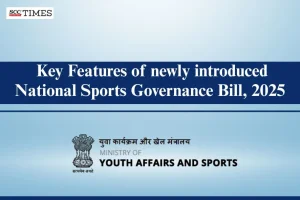On 23-7-2025, the Indian Government introduced the ‘National Sports Governance Bill’ in the Lok Sabha. After President’s assent the Bill will be called ‘National Sports Governance Act, 2025’. Recognising the importance for a structured regulatory framework that is designed to infuse transparency, discipline, and international alignment into India’s athletic ecosystem. The provisions of the Act are expected to create safeguards for athlete welfare, promote ethical conduct, and strengthen governance mechanisms across recognised sports bodies.
Designed in alignment with the Olympic Charter, Paralympic Charter, the Act establishes best international practices and standards. It provides fair and effective measures for a fair play culture, accountability, while introducing mechanism to resolve disputes related to sports, ensuring the protection of rights of sportspersons, and promotes diversity in leadership.
Key points of the National Sports Governance Act:
- The drafted Act comprises 11 detailed chapters, each focusing on key aspects of governance, ethics, dispute resolution, financial transparency, and athlete welfare within India’s sports ecosystem.
- It mandates the establishment of core national governing bodies for sports, including:
- National Olympic Committee
- National Paralympic Committee
- National Sports Federations
- Regional Sports Federations
- Each National Sports Body will consist of General Body, an Executive Committee, an Ethics Committee, a Dispute Resolution Committee and such related authorities. The Executive Committee, comprising up to 15 members with gender and athlete representation will be elected for a maximum term of four years, that includes sportspersons of outstanding merit and uphold inclusivity and representation.
- The National Sports Board (‘NSB’) will be created, as a statutory authority empowered to grant recognition, conduct inquiries, suspend or cancel affiliations, formulate ethics and safety policies, and oversee compliance with governance standards.
- The NSB will oversee the National Sports Election Panel, responsible for the appointment of electoral officers to conduct free and fair elections in line with the Representation of the People Act, 1951.
- The Act establishes a National Sports Tribunal (‘Tribunal’), a quasi-judicial entity vested with civil court powers under Section 215 of the Bharatiya Nagarik Suraksha Sanhita, 2023. Tribunal verdicts are appealable only before the Supreme Court.
- The Tribunal will serve as the judicial backbone of the new regime, delivering independent, swift, and cost-effective dispute resolution. It will be comprising of:
- A Chairperson with High Court or Supreme Court credentials
- Two members eminent in sports, law, or public administration
- This Tribunal is set with the intent to eliminate the need for athletes and federations to navigate cumbersome civil litigation, empowering stakeholders with fair and timely arbitration.
- Civil Courts will not entertain any suit or proceedings for the matters that are governed by this Tribunal. All Tribunal proceedings will be governed by the procedural framework established under Sections 228, 229, 233, 257, and 267 of the Bharatiya Nyaya Sanhita, 2023.
- The National Sports Body will formulate a Code of Ethics, aligned with international guidelines, and establish an internal grievance redressal system to address concerns from athletes, coaches, and affiliates.
- The Borad will frame a Safe Sports Policy to ensure the protection of women, minors, and vulnerable groups during all sports-related activities, events, and proceedings.
- Recognised sports organisations will be treated as public authorities under the Right to Information Act, 2005. Only duly recognised bodies will be eligible to:
- Receive financial grants from the Central Government
- Use terms like “India,” “National,” and associated insignia
- A dedicated National Sports Board Fund will be instituted, comprising grants, fees, and other receipts. It shall be audited periodically by the Comptroller and Auditor-General of India to uphold fiscal discipline.
- Legal immunity will be conferred upon members of the Board, National Sports Bodies, and Tribunal officials for any action carried out in good faith under the provisions of the Act.
-
National Sports Bodies are required to operate in alignment with International Charters and Statutes. In the event of conflict between domestic law and international obligations, the Central Government will issue clarificatory notifications to resolve the inconsistencies.
The Act when enacted will promote strong governance, ethical standards, and legal accountability to build a fair and transparent sports system. It will help India become a global leader in sports by ensuring integrity and long-term excellence in management and performance.

